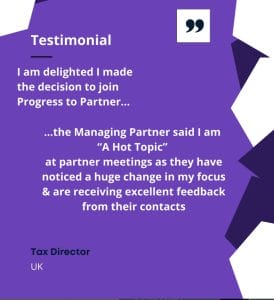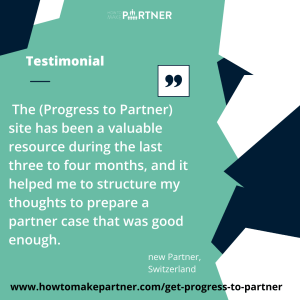It is your responsibility to drive your own development and career, not your firm’s. If you want to make Partner, you need to create your Partner Track Plan and you need to find the time to progress through it. To help you make the time for your career development, no matter how busy your day job is, here are 10 things that you must do.
*This blog is an excerpt from chapter 3 of the 3rd edition of Poised for Partnership. This chapter focuses on your ‘Plan’ to help you drive your career forward no matter how busy you are. Download the full chapter for free here.
10 ways to make time for your Partner Track Plan
1. Just start
 This may sound like a strange piece of advice, but actually starting on your Partner Track Plan is one of the best things you can do to find the time for it. Starting any big task is the hardest part, but once you do, action creates momentum. ‘Momentum’ creates a positive reinforcement cycle in our brain.
This may sound like a strange piece of advice, but actually starting on your Partner Track Plan is one of the best things you can do to find the time for it. Starting any big task is the hardest part, but once you do, action creates momentum. ‘Momentum’ creates a positive reinforcement cycle in our brain.
No matter how tiny the action is that you take, your brain’s reward system gets activated and gets a hit of the pleasure hormone, Dopamine. As you can imagine, the brain wants another reward, so you feel motivated to keep going with your task. When you anticipate getting the task done, your brain gets another hit of Dopamine, when you complete your task, another hit, and even when you’re reviewing your progress. That’s 4 doses of pleasure just for completing one small tiny action!
So that’s why just starting on your Partner Track Plan can set you up for success. Try it. Sit down and go through your plan, even if it’s just for 10 or 20 minutes at first. Start by setting yourself small and regular tasks to complete every week.
2. Prioritise your development
At present, your diary is undoubtedly full of fee-paying client work. That’s true for a lot of others trying to make partner! If you want to progress through the partnership track, you have to make time for your career development and the best way to do this is to treat it as a new client to service.
We have a great course in our subscriber-only site Progress to Partner called “How to Truly Commit to Moving your Career Forward”. It’s a game-changer and will get you focussed and help you to create the time and space to work a little on your career plan every.single.week. Check it out here!
Pursuing your own development requires time allocation, so treat your Partner Track Plan as an additional client. By doing this, you are essentially giving yourself permission to devote chunks of time to accomplish the necessary development work.
Useful resources to help with this:
- The reason why your Mindset is the biggest predictor of whether you make it to partner (or not)
- Fighting the “I don’t have time for this”. How to create daily habits for business development.
Why not sign up to my weekly newsletter here and you’ll find out what you need to be working on in your career development (and how to make the time for your career development) to progress your career in your firm.
3. Eliminate the “when”
 Have you already told yourself that ‘when you have…’ you will get started on progressing your career? I’ve worked with many lawyers, consultants, and accountants on their Partner Track Plan, and the excuses are always the same. This ‘thing’ which will sound the starting gun for their career progression is often a vague statement such as:
Have you already told yourself that ‘when you have…’ you will get started on progressing your career? I’ve worked with many lawyers, consultants, and accountants on their Partner Track Plan, and the excuses are always the same. This ‘thing’ which will sound the starting gun for their career progression is often a vague statement such as:
- In my next quiet period…
- When I am next on holiday…
- After my next appraisal…
- When I get a new job or get promoted…
- After I’ve won a new piece of business…
Sadly, this thinking often leads to delays in getting started (which as you saw from above is the most important step in gaining momentum!).
What may seem like a perfectly reasonable and logical timeline for getting started is usually your brain bringing out your Too Hard Box; tricking you into going back to your comfort zone and doing what you have always done.
If you find yourself doing this, make sure you have identified your ONE BIG FOCUS and Partner Track Plan for the next 3 months. Then, follow this up with diarising the actions from your Partner Track Plan.
We have a great course in our subscriber-only site Progress to Partner called How to put together a development plan to achieve your career goals. The course gives you the structure, clarity, and guidance to gain the skills, knowledge, mindset, and experience to take your career to the next stage or level – whatever you want that to be.
4. Pace yourself
It’s very common to feel overwhelmed by the huge amount of work you have to do for your career progression. For many, this actually motivates them to get started, but for others, it can stress them out enough that they put off getting started. If you’re more like the latter person, it’s really important that you take a breath. Your career progression is like running a marathon, not a sprint. Remember, you can only control what you can control, so start by taking the first small step: creating your first ONE BIG FOCUS and Partner Track Plan to achieve it.
The reality is, you will tend to overestimate what you can achieve in the short-term and underestimate what you can achieve in the long term. Make a commitment to yourself. Every 3 months you will review your career progression and reset your ONE BIG FOCUS, then create a Partner Track Plan to achieve your ONE BIG FOCUS. It really can be this simple.
5. Create time to review your progress
 It is too easy to always be looking towards the next thing you need to achieve. However, being on Partner Track is a time for incredible personal growth and change, so you need to get used to looking back too. It is crucial to set aside time to review what you have learnt and what you need to focus on. This shouldn’t just be done once every 3 months as you reset your ONE BIG FOCUS. It is a good idea to put aside some time every month, potentially with your coach to do this.
It is too easy to always be looking towards the next thing you need to achieve. However, being on Partner Track is a time for incredible personal growth and change, so you need to get used to looking back too. It is crucial to set aside time to review what you have learnt and what you need to focus on. This shouldn’t just be done once every 3 months as you reset your ONE BIG FOCUS. It is a good idea to put aside some time every month, potentially with your coach to do this.
If you’d appreciate a little help with your career in your firm why not sign up to my weekly newsletter here and you’ll find out what you need to be working on in your career development (and how to make the time for your career development) to progress your career in your firm.
6. Learn how to say no
When you are trying to build a high internal and external personal market value, it can be tempting to think that you have to say “yes” to everyone. The reality of the situation is that you will always have partners or team members asking you for things or members of your network wanting to meet you for coffee. Too much “yes” can easily lead to overwhelm or not having enough time to do the things that really matter. The best ways to decline gracefully involve:
- Helping them find a solution without using you, e.g. “have you tried using…?”
- Explaining your time constraints and finding out if they have any flexibility on timescales or how they want things to be done.
- Using your secretary to manage your diary and act as a gatekeeper for people who want to meet you.
- Offering to help them a little but not the whole hog, e.g. “No, I can’t do that, but I can do this.”
- Ask for time to think about it. You may find that the request goes away or you find a way to fulfil it in a way that works for you and the other party.
7. Start delegating effectively
 If you are going to expand the amount of time you have to build your practice, you will need to learn to delegate well to more junior staff. This means, delegating the lower value tasks that you don’t need to do to others. It means, delegating authority as well as tasks (so that they don’t need to come to for decisions or for signing off).
If you are going to expand the amount of time you have to build your practice, you will need to learn to delegate well to more junior staff. This means, delegating the lower value tasks that you don’t need to do to others. It means, delegating authority as well as tasks (so that they don’t need to come to for decisions or for signing off).
You don’t have to do everything yourself. You have a team for a reason, so use them. Use them to support you while you spend some of your time on the valuable tasks that will progress your career.
8. Network with purpose
When you are told you need to start to bring in your own work, what is the first thing you do? Go networking. Of course, done well, networking is one of the best ways to grow your profile and generate new business. With that being said, however, if you haven’t taken the time to really consider why you are networking, the brand you want to build, and the people you need in your network, you may as well have not gone out or online to network in the first place. The last thing you want to do is spend the time you don’t have, networking with no direction. Here are some useful resources to help you network with a purpose:
- The ultimate guide to putting together your networking strategy to save you time (and heart ache)
- 8 tips to help you spend less time networking but more time winning business
- Why internal networking could be your secret weapon to getting promoted in your firm
- The 4 Best Business Networking Books for Lawyers and Accountants
9. Improve your management of junior staff
 Continual disruptions, poor quality work, and too much time spent reworking are some of the most common complaints about junior staff. Most of these complaints don’t stem from poor quality junior staff, however, they stem from a lack of good team management! Ever heard of the phrase, “you get the staff that you deserve?“
Continual disruptions, poor quality work, and too much time spent reworking are some of the most common complaints about junior staff. Most of these complaints don’t stem from poor quality junior staff, however, they stem from a lack of good team management! Ever heard of the phrase, “you get the staff that you deserve?“
It’s harsh but true. If you don’t take the time to polish your people management skills, build a high-quality team who you can trust beneath you, and support each individual in their training and development, your team won’t generate the output that you want them to.
Another great course to help you in Progress to Partner Academy is “How to Excel as a Line Manager.“. It’s a great course that will give you the skills and mindset to become the line manager who is able to get the best out of their people.
Remember – you have to lead and manage and coach to get the results that you want.
Read:
10. Use a default diary
How to find the time to fit it all in, particularly business development when you have a full caseload, is a typical challenge for anyone on Partner Track. A good way to always find the time is to use a default diary. This is where you have a standard daily, weekly, monthly, quarterly routine, which is timetabled permanently into your diary. This makes sure that the important (but often non-urgent) stuff, such as working on your Partner Track Plan, business development and meetings with your team members, happens. For example, one of our clients used to block out every Friday morning as her time to work on her Partner Track Plan.
If you’d appreciate a little help with your career in your firm why not sign up to my weekly newsletter here and you’ll find out what you need to be working on in your career development (and how to make the time for your career development) to progress your career in your firm.
No more waiting and wishing, start doing!
The hardest part of making Partner is finding the time to work on your career to build a strong Business and Personal Case. Using the ONE BIG FOCUS approach and accompanying Partner Track Plan, will stop you getting overwhelmed with what needs to be done and ensure you have consistent progress towards partnership.
Stop the search! Everything you need to know (and everything you need to do) is all in one place at our Progress to Partner Academy. Guides, webinar recordings, workbooks and self-study courses that will make it much easier to build your “partner-ready” skills.
Remember, it is your responsibility to drive your own development and career, not your firm’s. So stop waiting and wishing that you had time to focus on your progression. Use these 10 steps to make time and start doing!
Don’t forget to download the full chapter of the 3rd edition of Poised for Partnership. This chapter will help you work out what motivates you, what makes you tick, and whether partnership is right for you and if it’s what you want. Download the full chapter for free here.
So you think you’re Ready to Make Partner?
Discover your Partnership Readiness Score?
Do you know your strengths and how to work on your weaknesses?
 Take our free Partnership Readiness Assessment to see how ready you are for partnership! Measure yourself against the 12 key indicators and identify where you need to work on to be a stronger candidate. It takes 10-15 minutes so make sure you have time before you get started!
Take our free Partnership Readiness Assessment to see how ready you are for partnership! Measure yourself against the 12 key indicators and identify where you need to work on to be a stronger candidate. It takes 10-15 minutes so make sure you have time before you get started!Read our most popular articles:
- How early should I start preparing for partnership?
- What does it really mean to make partner? You may be surprised!
- Do you really want to make partner? The pros and cons of partnership
- Partnership admissions process: what is involved?
- How do I become a partner at the Big 4?








